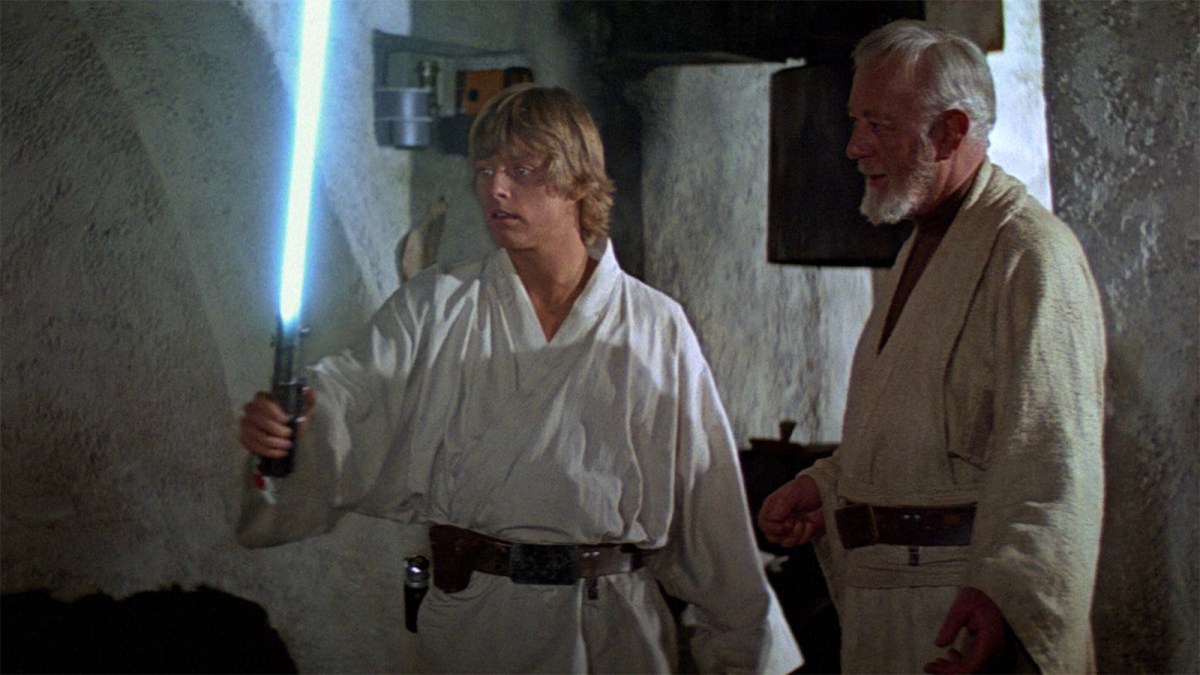Imagine watching a Star Wars film from 1958. That’s almost what you experience when watching The Hidden Fortress, a Japanese film from world-renowned director Akira Kurosawa.
Of course, it’s not really like watching a Star Wars film, but George Lucas has often cited it as an inspiration and even though many other sites not named wegotthiscovered.com have written about it, none that I can see have pinpointed all of the exact similarities we found between The Hidden Fortress and the original Star Wars trilogy.
First, let’s quickly explain The Hidden Fortress.
It’s a film that takes place in Japan’s Sengoku Period (16th Century) and is about a General in the Akizuki clan who tries to protect the clan’s princess by leaving the conquered Akizuki territory for the neighboring ally of Hayaka. Problem is, the rival Yamana clan, who now control Akizuki territory, are heavily guarding the border between Akizuki and Hayaka. The other problem? The General is also transporting the gold of the Akizuki clan. Needless to say, there’s a price on their head.
The General is named Rokurota Makabe and is played by the legendary Toshiro Mifune. There are also two peasant characters, Tahei and Matashichi, that the movie mostly follows as the story is initially told through their perspective. This is what George Lucas says made the biggest impression on him and is why he also tells Star Wars through the two lowliest characters of C-3PO and R2-D2. Not only is Tahei much taller than Matashichi but, much like our favorite Star Wars droids, they also often bicker and provide the comedy of the film.
Despite their foolishness, it’s Tahei and Matashichi’s idea to avoid the heavily guarded Akizuki-Hayaka border that the General acts upon. They suggest going into enemy Amana territory where they wouldn’t be expected to be and then crossing the Amana-Hayaka border. The General believes this idea to be ingenous and is ultimately the reason why he brings them along, though the two peasants are ignorant to what’s really happening as they have no idea that the teenager is Princess Yuki nor do they believe that Makabe is a general.
George Lucas claims that the two peasants provide the only real inspiration he took from the film, other than certain directorial aspects. We’re pretty confident, however, that you’ll respectfully disagree with his claim after reading this article.
We should point out that Tahei is the C-3PO character and is played by Minoru Chiaki. His smaller sidekick, the R2-D2 character, is played by Kamatari Fujiwara. Both are excellent in this film and had lengthy successful careers in Japan.
Princess Yuki is played by Misa Uehara who only appeared in a handful of films before leaving acting altogether.
Now let’s get into the similarities. First of all, we should point out that Lucas uses the same scene transition technique, often described as a camera swipe, in Star Wars as Kurosawa does in The Hidden Fortress.
We narrowed it down to the 11 most obvious similarities but we will go through them in order of how they appear in the original Star Wars trilogy.
1. Two friends, walking in a desolate area, bicker then go their separate ways.
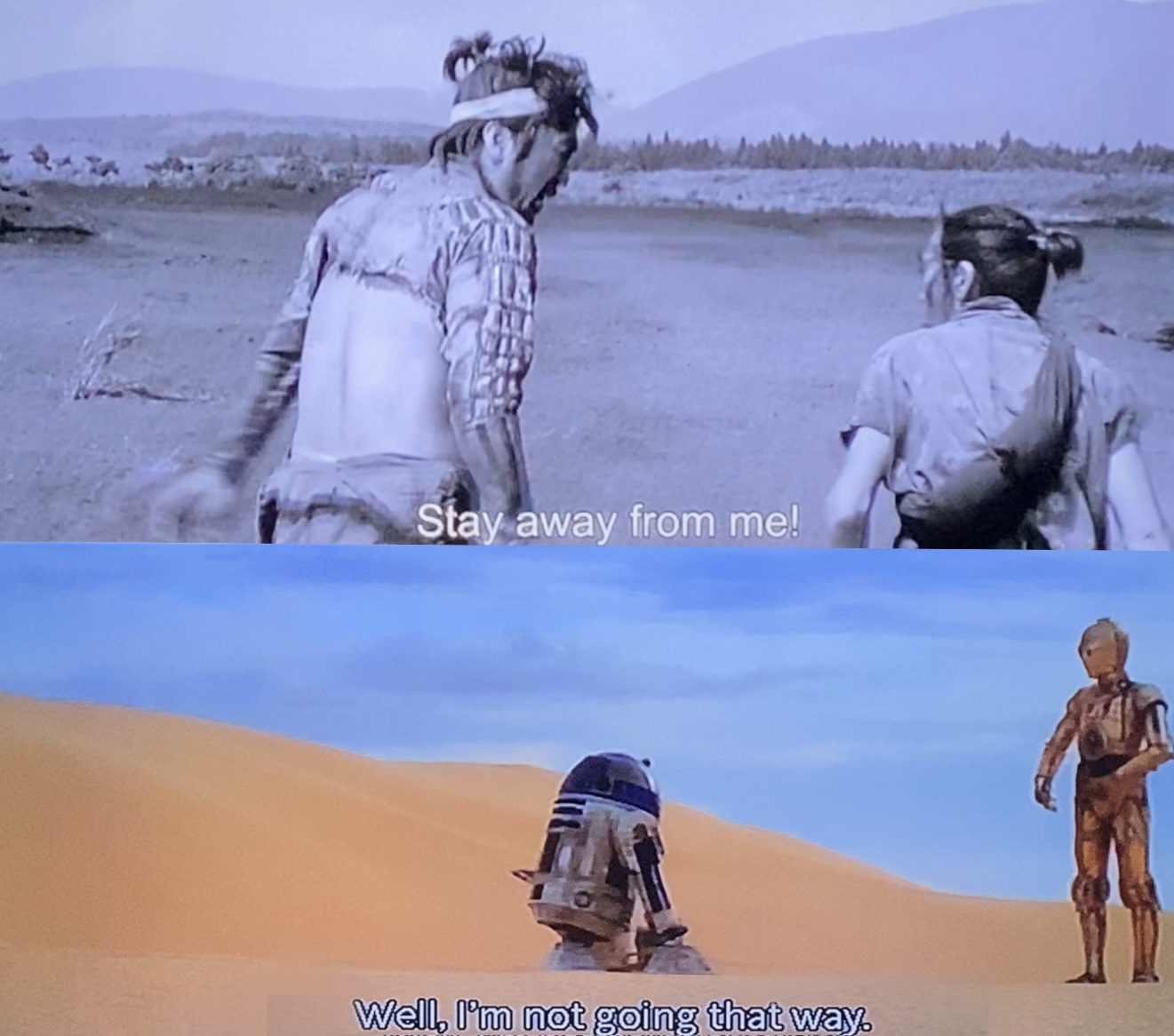
This scene opens The Hidden Fortress, as Tahei and Matashichi argue over where to go, insult each other, and then separate. This happens fairly early in Star Wars as C-3PO and R2-D2 argue over where to go once they end up on Tattooine. C-3PO insults R2-D2, calling him a scrap pile, and they then separate.
2. Our two friends are reunited thanks to them both being captured
R2-D2 is captured by Jawas who are stealing stray droids to sell them as parts are as whole to the people of Tattooine. We soon realize that a lot of other droids were captured, including C-3PO. Despite their predicament, they’re excited to reunite.
After Matashichi is captured by Amana soldiers, along with many other peasants, he later spots Tahei who was also captured and, despite their predicament, they’re excited to reunite.
3. One tough Princess trying to get to safety

In the 2001 Criterion Collection interview for the DVD release of The Hidden Fortress, Lucas says, “The fact that there was a princess trying to get through enemy lines was more of a coincidence. In my film the princess is more a stand-and-fight kind of princess.”
The strangest part of this Lucas quote is that Princess Akizuki in The Hidden Fortress is very much a stand up-and-fight type of princess whom Leia is basically a carbon copy of. She’s a good-hearted princess who can fight for herself and has a talk-back attitude that completely make you rethink what a princess is. I mean, she is basically Princess Leia (or should I say that Leia is basically Princess Yuki?). So, as much as I like and admire George Lucas, this claim by him is questionable at best.
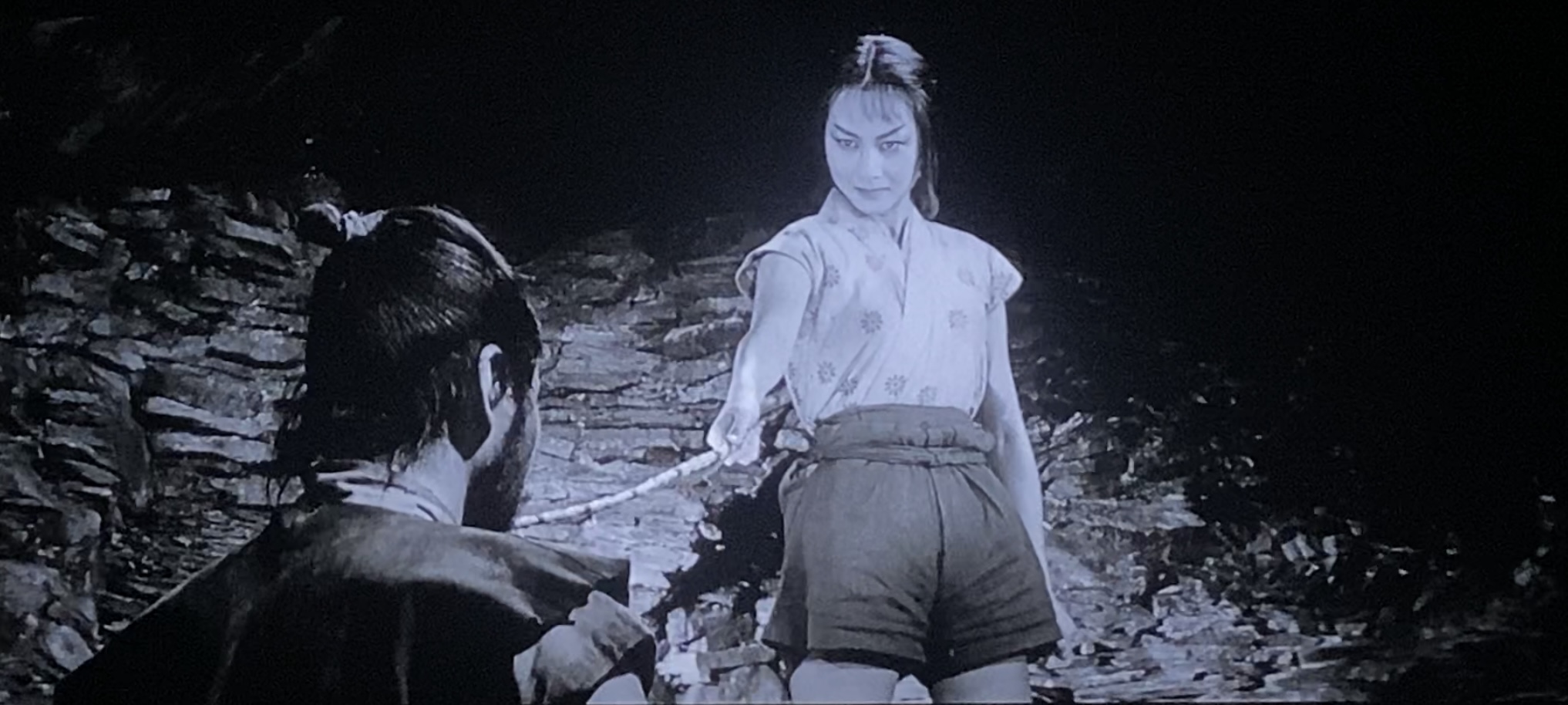
Both Princesses are teenagers, are caught in enemy lines and need help getting out, and often take charge in times when most would expect a princess to be reserved. As you can see by the image we put together, they even sleep the same. In regards to both stories, the princess’ predicament is what moves the plot because the need to get her to safety is its driving force.
Kurosawa said he wanted a princess who can pass as a samurai’s daughter. This is certainly accomplished.
4. Is someone only in it for the money?
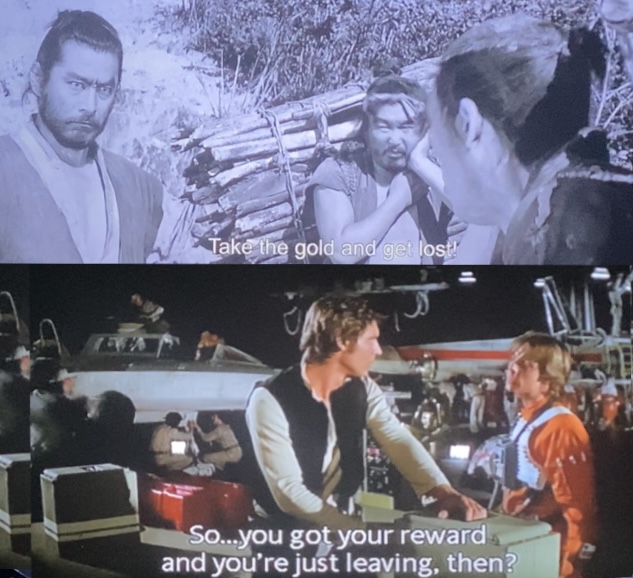
In Star Wars, Han Solo takes the rebellion’s money and runs when they need him the most and as a result Luke Skywalker berates him for his greed. Solo soon changes his mind and comes back to help save the day.
In The Hidden Fortress, it’s our droid characters of Tahei and Matashichi who are singularly fueled by greed. At one point, the General berates them but they quickly come back, thought they are more or less forced to because the area is surrounded by Amana soldiers.
5. The award ceremony
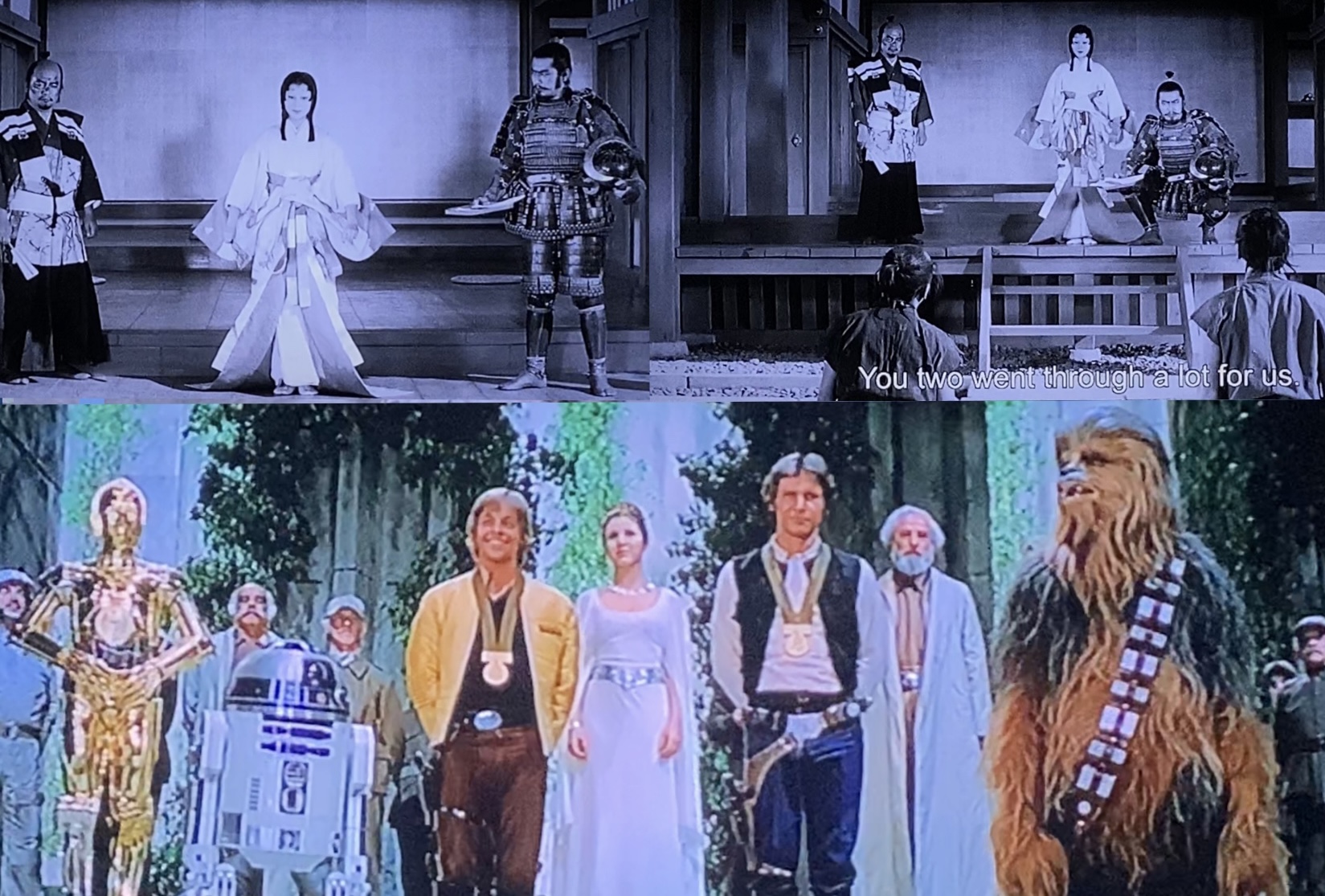
At the conclusion of Star Wars, princess Leia awards Luke Skywalker and Han Solo for saving the rebellion.
At the conclusion of The Hidden Fortress, Princess Yuki of Akizuki clan awards Tahei and Matashichi for their assistance in helping get her to safety.
It’s worth noting that Han Solo was awarded earlier in Star Wars for helping get the princess to safety.
6. The landscape of Dagobah
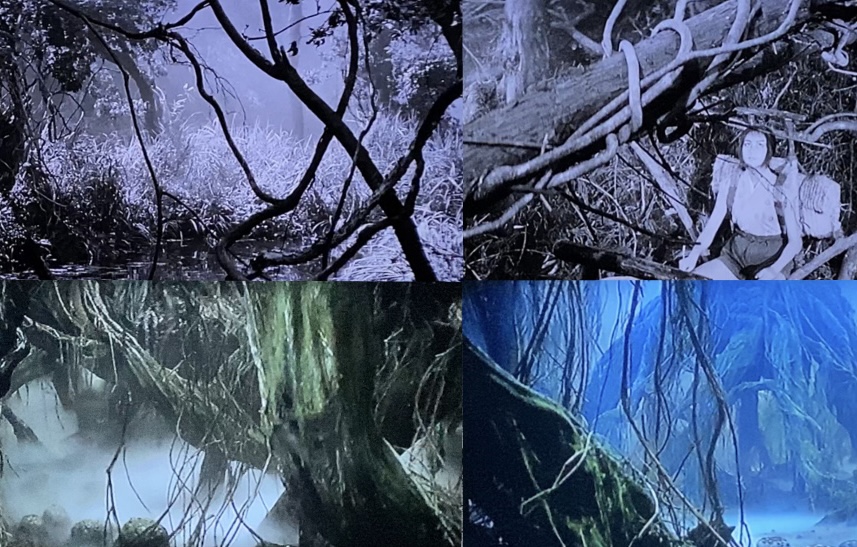
Certain areas of the forest in The Hidden Fortress, which sometimes get foggy, are quite similar to the visuals of Dagobah in The Empire Strikes Back.
7. The friend who may not be much of a friend.
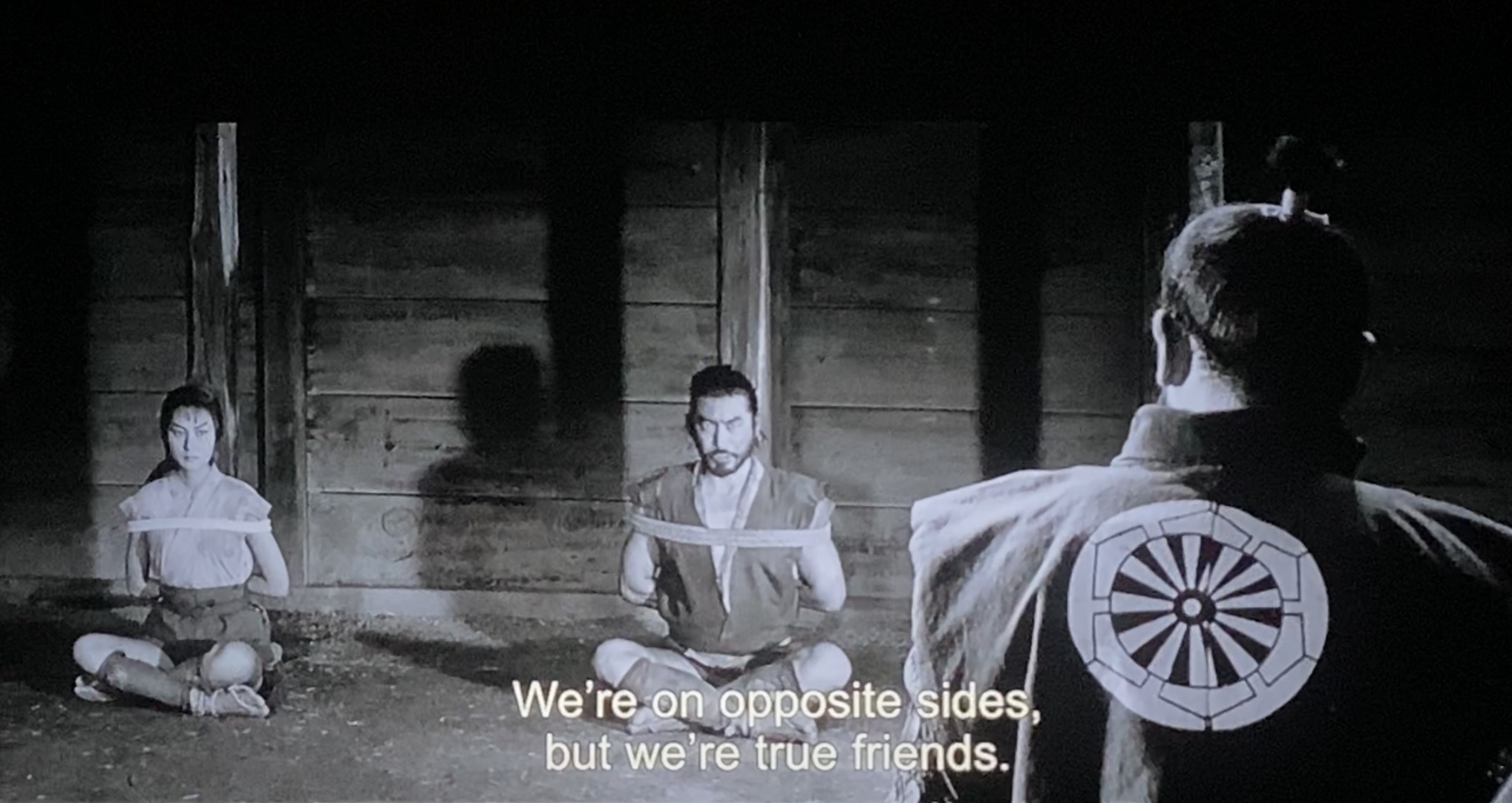
In The Empire Strikes Back, Han Solo is backstabbed (not literally) by his “sort of” friend Lando Calrissian. While under Calrissian’s watch, Solo is placed under custody of the Empire before being frozen in carbonite. Lando ultimately has a change of heart at the last minute and he frees Leia and Chewbacca just as they’re being taken away. Calrissian joins them in their escape and he becomes a part of the rebel alliance.
In Hidden Fortress, there is a minor character named Hyoe Tadokoro, played by Susumu Fujita, who plays a significant role. When he initially appears, he is a “sort of” friend to General Rokurota Makabe but when Makabe is later captured, it’s under the watch of Tadokoro.
In The Empire Strikes Back, after being taken prisoner, Han Solo contemptuously calls Calrissian his friend before punching him.
In The Hidden Fortress, Makabe is captured but while a prisoner he tells Tadokoro they’re friends. Just like Calrissian, Tadokoro has a change of heart at the last minute and frees the prisoners just as they’re being taken permanently away. He then joins them in their escape and he becomes a part of the Akizuki clan.
8. Destroying the surroundings in the film’s featured duel

During a lightsaber duel with Luke Skywalker in The Empire Strikes Back, Darth Vader uses the force to throw everything but the kitchen sink at him, though it’s possible that the kitchen sink is also used. In doing so, Vader destroys the surroundings.
In The Hidden Fortress, Hyoe Tadokoro and our General hero duel with staff and they both destroy their surroundings while doing so. Those surroundings include tables, chairs, banners, and even the kitchen sink (ok, maybe that last one).
9. An exciting chase
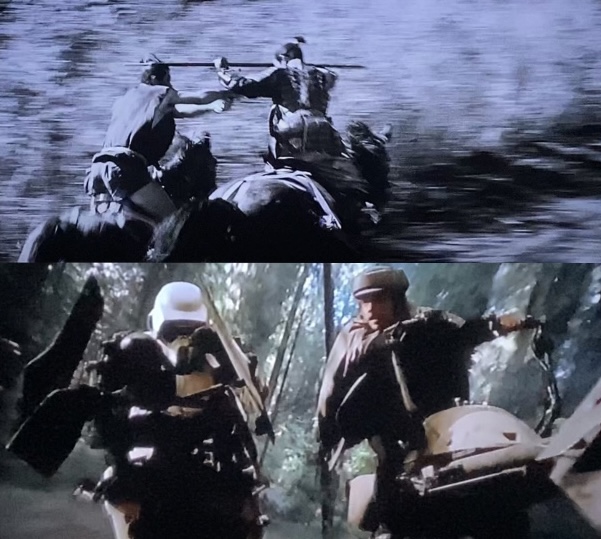
When Han Solo engages Forest Troopers on the moon of Endor during Return of the Jedi, one of the troopers tells his other two companions to go for help. They ride off on their speeders but Luke and Leia pursue them on another, ultimately taking them down along with two other troopers that joined the chase.

In The Hidden Fortress, General Makabe engages the Yamana forces and one of them tells his other two companions to go and report it. As they ride off on horseback, Makabe points to Akizuki and tells her to run for the hill (similar to when Han Solo points to a rebel and tells him to take the squad ahead). Makabe then grabs a horse and chases the two soldiers. He uses his sword while on horseback during a chase that seems to be clearly mimicked by Lucas.
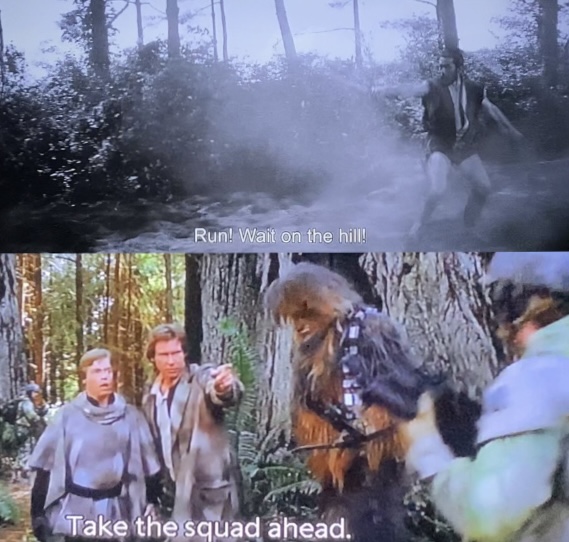
10. A mini-ambush
In Return of the Jedi, C-3PO and R2-D2 bait stormtroopers into an ambush. This happens on the forest moon of Endor immediately after the rebels are captured, including Solo and Leia. The droids call over to the stormtroopers who run after them and are then ambushed by Ewoks. Suddenly, a war horn is heard as the Ewoks signal that the battle has begun.
In a scene in Hidden Fortress, our droid characters, Tahei and Matashichi, are in the forest trying to sneakily get away from two spearman of the Amana clan. Once they start running, the two follow but Tahei and Matashichi run back to where General Makabe is and it results in an unintended ambush by Makabe who quickly disarms the two. Suddenly, a war horn is heard in the distance.
11. A celebration amongst drums, dance, and fire

Return of the Jedi ends with a celebration in the Ewok village. This is similar to a scene in The Hidden Fortress when our hero characters join an Amana fire festival. Both scenes take place at night and have fire, music, dance, and large drums.
Thus ends our comprehensive list of similarities between The Hidden Fortress and the original Star Wars trilogy. Are most of these just a coincidence like George Lucas suggests or was he maybe very heavily influenced by one of his favorite Kurosawa films: The Hidden Fortress?

